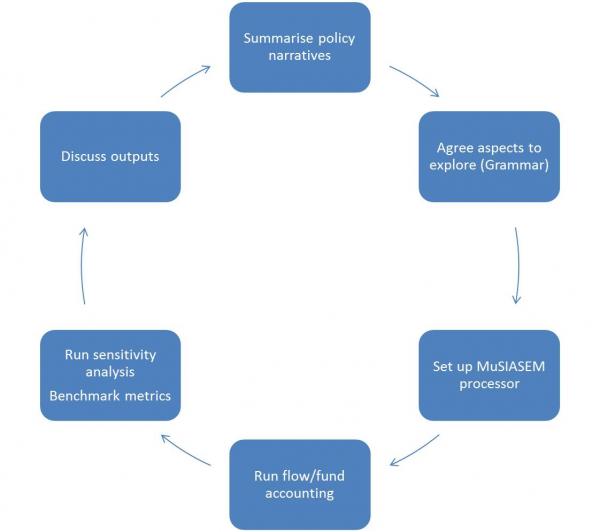“Quantitative Story Telling”: new method, same challenges for nexus policy studies
Posted by Kirsty Blackstock on Thursday 17 November 2016
In September I participated in a session entitled, “Be constructive! Situating sustainability research at the nexus of positivism and reflective positionality” during the RGS-IBG 2016 conference on ‘Nexus Thinking’. I told a story about telling a story. My story was about how quantitative methods and data are used in processes of understanding and making sense of our world, about the role of stories and numbers in the processes of knowledge production (and reproduction).
My talk was based on a new project that I’m embarking on with colleagues from around Europe and beyond. This is called MAGIC (Moving Towards Adaptive Governance in Complexity: Informing Nexus Security), and is funded under the European Union’s Horizon 2020 research and innovation programme.
MAGIC uses the idea of ‘Quantitative Story Telling’ (QST). The idea of QST draws attention to the dynamic processes and relationships involved in the full modelling cycle, from the very initial framing and definition of the problem to model, through which variables to combine, the generation of quantitative results and how these are legitimated, interpreted and used (or not used) in decision making processes.

The Quantitative Story Telling Cycle
We plan to apply this approach to case studies of water, energy and food nexus across different scales, looking at European Union Policy implementation and innovations developed to respond to nexus challenges. At the heart of the QST is a bio-economic accounting approach called MuSIASEM. This draws attention to the role of material flows and funds in the ways in which we configure our societies, and the environmental, social and economic impacts of these configurations. QST asks us to explicitly stop and critically reflect on the stories we tell about living in our worlds, both our current situation and the futures that we seek.
Our approach follows the principles of ‘post-normal science’, to be used when ‘facts are uncertain, values in dispute, stakes high and decisions urgent’ (Funtowicz and Ravetz, 1993). For example, QST recognises the role of values and perceptions in framing the problem to model and interpreting results of the model. It draws attention to production and use of scientific evidence and argues for an ‘extended peer review’ of the quality of modelling through engaging non-academic stakeholders who have their own expertise to bring to each stage of the QST process. As such, it should not really be considered as ‘new’ given the legacy of critical quantitative and spatial methodologies from 1960’s and 1970’s, but unfortunately, post-normal approaches seem still to be rare. We intend to apply QST to highlight and challenge dominant discourses about the water, energy and food nexus. We also seek to go beyond the standard technological responses suggested as solutions to these challenges, given that such responses tend to be rooted in the neo-liberal discourses of efficiency and ecological modernism. However, we need to remain constructive, and engage with people’s pre-existing ideas and expectations. Thus, our challenge is to offer a more progressive alternative that recognises the constraining and creative drivers of history, context, pluralistic motivations and multiple perspectives on success. Check on our project webpageor email me to find out how we handle this over the next 4 years!






Comments
Post new comment